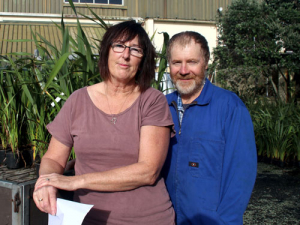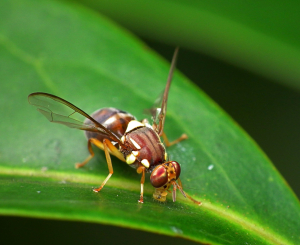This week they’ve picked up the 300-plus native plants they need to complete riparian protection along the almost 3km of streambank on their 58ha Okato property as part of the Taranaki Regional Council’s Riparian Management Programme.
This gets them to the finish line well ahead of the 2020 deadline looming for farmers on Taranaki’s ring plain and coastal terraces to have all their streambanks fenced and planted.
The Bridgemans say it’s been ‘hard yakka’ at times but the result is well worth the effort. “We understand why we need to do it, and we’re happy to be doing our small bit towards cleaner waterways, as expected by the wider community,” says Rob.
Fencing streambanks keeps stock out of waterways and vegetation helps to trap and filter run-off from pasture, and improves stream biodiversity. The Taranaki Regional Council’s Riparian Management Programme, which began in the mid 1990s, has seen waterways protected with millions of native plants and thousands of kilometres of fencing. A recent NIWA study found that this has improved ecological health and reduced bacterial levels in Taranaki streams and rivers.
The Bridgemans began fencing and planting their streambanks in 2010 after the Council developed a free Riparian Management Plan tailored for their property. “I remember we were trying to get a fencepost in in a tricky area where the tractor couldn’t go – it needed such an effort that we ended up bursting into laughter at ourselves,” says Di. “So we had a lot of fun too, and got the whole family involved.”
The couple say they had mixed feelings when they started. Although the scheme was voluntary, they still saw it as a requirement that was being imposed upon them.
“But once we got into it, we could start seeing the benefits,” says Rob.
“It’s a matter of complying with requirements and expectations, and it goes beyond that. We want cleaner waterways too, and we’re also enjoying the visual impact and the return of bird life.
“And from a stock-management point of view, it’s been useful to fence animals out of awkward areas where you didn’t want them to be. We used to get animals falling into drains – nothing worse than going out for early milking and finding a cow stuck in a drain.”
They were also inspired and motivated by seeing well-established riparian planting on other farms, and realising their own property would look as good if they kept the effort up.
They’ve even protected additional areas, including a wetland, beyond their original plan.
“Now, when we see a farm for sale with not much riparian fencing or planting, we shake our heads and wonder who would buy it when so much work is needed. Lack of riparian protection is a real deterrent,” says Di.
“We see our fencing and planting as an investment for the future,” says Rob. “We’ve definitely beautified the farm.”
At their peak, the Bridgemans were getting 1,000 plants a year under the scheme, in which the Council sources native plants and sells them to the farmers at cost, and also organises contractors if farmers require them. “When we had really big plant orders, we got contractors in to get the planting done,” says Rob. “They got the job done well, and I thought they were cost-efficient.”
They say that now they’ve just about finished, there’s little they need to do to keep their riparian margins maintained. “It largely takes care of itself if it’s done properly,” says Di. “It’s a big temptation to leap in when you see weeds appearing in the early stages, but they’ll get crowded out as the native plants get bigger.”
Farmers should talk to their TRC Land Management Officer, call the Council on 0800 736 222 or email This email address is being protected from spambots. You need JavaScript enabled to view it..









